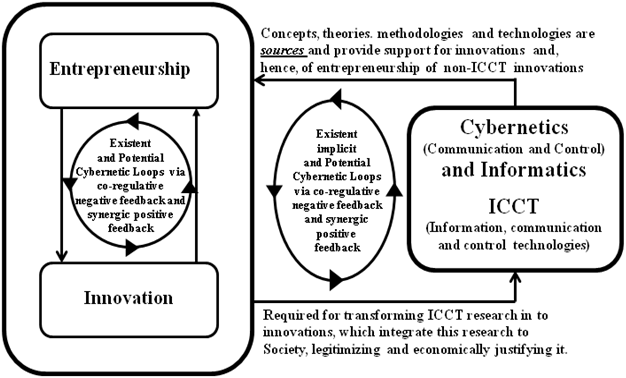|
"Innovation is the specific tool of Entrepreneurs, the means by which they exploit change as opportunity of a different [new] business or a different [new] service… Entrepreneurs need to search purposefully for the sources of innovations, the changes and their symptoms that indicate opportunities for successful innovation." 1
|
|
"The "entrepreneur always searches for change, responding to it, and exploit it as an opportunity."2
|
|
"Many in business today use Darwin's theories to describe the need to "Innovate and Thrive, or Die." Hence, the term "Innovation" has grown tremendously in popularity and interest throughout the study of modern business."
3
|
Drucker also affirms that Entrepreneurship is in itself an innovation, a managerial innovation. What "[g]rowth enterprises have in common [is] a 'new technology'…The 'new technology' is entrepreneurial management."4
Consequently, entrepreneurship is a managerial innovation and innovation is a tool, a mean for entrepreneurship. It seems evident that Innovation and Entrepreneurship are (or might be) cause and effect of each other, systemically integrated, and related by means of cybernetic loops through potential co-regulative loops (via negative feedback and/or feedforwad) and co-amplificatory and possibly synergic loops (via positive feedback).
Since 1) "entrepreneurs need to search purposefully for the sources of innovations," and 2) among what seems to be the most effective sources of innovations (including managerial innovations, i.e. entrepreneurships), are communications & control (Cybernetic) and Informatics tools, then a conference on Cybernetics and Informatics seems to be an adequate context for a Special Track on "Innovation and Entrepreneurship." This might be especially true if we notice that "Innovation and Entrepreneurship" are (or might be) cybernetically related to "Cybernetic and Informatics" tools and technologies (see figure below)
Concepts, theories, methodologies, and technologies related to Cybernetics and Informatics are sources of and provide support for innovations and, hence, entrepreneurship of non-ICCT (Information, Communications, and Control Technologies) innovations. Reciprocally, entrepreneurship and innovations are required for transforming ICCT research into innovations, which integrate this research to Society, legitimizing and economically justifying it. Hence, we can notice the present implicit and potentially "explicitable" (not yet documented or consciously thought or practiced) cybernetic relationships between "entrepreneurship and innovations" on one hand and "Cybernetics and Informatics" on the other. To make explicit this kind of relationships is one of the main purposes of the Special Track on Innovation and Entrepreneurship: SIE 2023.
1Peter Drucker, 1998, Innovation and Entrepreneurship, New York: Harper, p. 19; emphasis is added
2Druker, op. cit. p. 28 (author's italics and emphasis added)
3Fred A Maymir-ducharme, 2014, Informal communication (emphasis added); Maymir-ducharme add that "Darwin talks about 'Natural Selection' and 'Survival of the Fittest' [implies that] in the struggle for survival, the fittest win out at the expense of their rivals because they succeeded in adapting themselves best to their environment" (emphasis added)
4Drucker, op. cit. p. 11

Concepts, theories, methodologies, and technologies related to Cybernetics and Informatics are sources of and provide support for innovations and, hence, entrepreneurship of non-ICCT (Information, Communications, and Control Technologies) innovations. Reciprocally, entrepreneurship and innovations are required for transforming ICCT research into innovations, which integrate this research to Society, legitimizing and economically justifying it. Hence, we can notice the present implicit and potentially "explicitable" (not yet documented or consciously thought or practiced) cybernetic relationships between "entrepreneurship and innovations" on one hand and "Cybernetics and Informatics" on the other. To make explicit this kind of relationships is one of the main purposes of the Special Track on Innovation and Entrepreneurship: SIE 2023.
Consequently, the Organizing Committee of the SIE 2023 invite researchers, scholars, professionals, and practitioners in the related areas to present their work, reflections, case studies, etc. on:
- Conceptual, theoretical, methodological, or practical relationships between "innovation and entrepreneurship" and "Cybernetics & Informatics."
- How could Cybernetics & Informatics concepts, theories, methodologies and technologies be used to enhance innovation and entrepreneurship?
- Innovation/Entrepreneurship and Informatics/Cybernetics in the 21st Century
- Innovation and entrepreneurship in ICCT and non-ICCT theory and practice, indicating the role of ICCT as actual or potential enablers.
- Case studies of innovation and entrepreneurship in the area of "Cybernetics & Informatics": institutional and individual actors, drivers and obstacles, framework conditions, good practice examples, outcomes, policy recommendations.
- Role of university-industry-government partnerships in enhancing innovation and entrepreneurship in Cybernetics & Informatics.
- Ways to enhance the visibility of innovation and entrepreneurship in Cybernetics & Informatics in the entrepreneurial education provided to university students (e.g. something similar to the NSF-funded Epicenter program for supporting entrepreneurship education for undergraduate engineering students, see http://epicenter.stanford.edu/)
Suggested Topics
Above we suggested the main themes. We suggest the following non-exclusionary topics, which intersect with the above themes:
- Cybernetic or reciprocal cause-effect relationships between innovation and entrepreneurship.
- Information, communication and/or control technologies (ICCT) as cause and/or effect of academic innovation and entrepreneurship
- Facilitating ICCT innovations via research, patents and entrepreneurship
- Innovation and Technological Transfer
- Causes and/or effects of Innovation and Entrepreneurship: Is there any cybernetic loops between causes and effects, input and outputs?
- Collaboration in innovation and entrepreneurship: ICCT support?
- Inter-nationalization of innovation and education: ICCT support?
- Facilitating innovation and entrepreneurship by ICCT support
- Scientific innovations though technological tools and entrepreneurship
- Academic and/or educational innovation and entrepreneurship
- Innovation and entrepreneurship in and/or for not-for-profit organizations
- Creativity and innovation/entrepreneurship
- Patents as sources of innovation and entrepreneurship
- Venture Capital as effect (or cause?) of innovation and entrepreneurship
- Culture and innovation/entrepreneurship
- Education for innovation and entrepreneurship: e-learning support?
- Innovation and Entrepreneurship in a Global Economy
- Inter-cultural communication for innovation/entrepreneurship in the global economy
- Formal or informal Engineering as bridge between scientific production and Academic innovation/entrepreneurship
- Entrepreneurship Development Program in educational organizations
- Innovation and entrepreneurship in a non-scientific but practice context
- Multi-disciplinary teams and inter-disciplinary communication in the context of innovation and entrepreneurship
- Case Studies in innovation and entrepreneurship
- Socio-economic development and innovation/entrepreneurship
- Academic innovation and entrepreneurship
- Innovation and entrepreneurship for the community good
- Innovation and entrepreneurship for national or regional development
- Innovation and entrepreneurship ecosystems
- Societal-Driven Innovation and entrepreneurship
- Learning by doing: Action-Learning
Program Committee
Khalid Alhayyan, Saudi Arabia
Lee A. Angelelli, USA
Dietmar Bönke, Germany
Gabriela C. Florescu, Romania
Cristian-Gyözö Haba, Rumania
Jeremy Horne, USA
Nancy Lind, USA
John Jenq, USA
Mark Marino, USA
Fred A Maymir-Ducharme, USA
Ali Mostafaeipour, Iran
Susu Nousala, Finland
Sandra-Dinora Orantes-Jiménez, Mexico
Wing K. Tam, Australia
Yevgeniya Sulema, Ukraine
Esther Zaretsky, Israel
Important Information for your Submissions to SIE 2023
Virtual Participation
Submissions for Face-to-Face or for Virtual Participation are both accepted for the conference. Both kinds of submissions will have the same reviewing process and the accepted papers will be included in the same proceedings, and will have the same selection process for the best papers to be published in the Journal with no additional charge.
Virtual Sessions
Face-to-face sessions of all jointly organized events will have associated virtual pre- and post-conference sessions where registered participants can comment each paper in a forum associated to it. Registered participant at any event will have a password to access any virtual session of any collocated event. Consequently, sessions papers can be read before the conference, and authors presenting at the same session can interact three days before and during the conference, as well as up to three weeks after the conference is over. Authors can also participate in peer-to-peer reviewing in virtual sessions.
Reviewing Process
All Submitted papers/abstracts will go through three reviewing processes: (1) double-blind (at least three reviewers), (2) non-blind, and (3) participative peer reviews. Final acceptance depends of the three kinds of reviews but a paper should be recommended by non-blind reviewers AND blind reviewers in order to be accepted for presentation at the conference and to be included in the respective conference proceedings. A recommendation to accept made by non-blind reviewers is a necessary condition, but it is not a sufficient one. A submission, to be accepted, should also have a majority of its double-blind reviewers recommending its acceptance. This double necessary conditions generate a more reliable and rigorous reviewing than a those reviewing methods based on just one of the indicated methods, or just on the traditional double-blind reviewing. More details regarding this issue can be found at www.iiis.org/peer-reviewing.asp.
The three kinds of reviews mentioned above will support the selection process of those papers/abstracts that will be accepted for their presentation at the conference, as well as those to be selected for their publication in JSCI Journal. Details regarding the Acceptance Policy can be found at www.iiis.org/acceptance-policy.asp.
Comments and evaluations of the reviewers
Authors of accepted papers who registered in the conference can have access to the evaluations and possible feedback provided by the reviewers who recommended the acceptance of their papers/abstracts, so they can accordingly improve the final version of their papers. Non-registered authors will not have access to the reviews of their respective submissions.
Invited Sessions Organizers
Registration fees of an effective invited session organizers will be waived according to the policy described in the web page (click on 'Invited Session', then on 'Benefits for the Organizers of Invited Sessions'), where you can get information about the ten benefits for an invited session organizer. To propose the organization of an Invited Session, please visit the conference website, and go to the menu option "Invited Sessions" and then to the menu sub-option "Invited Sessions Organizers."
Best Papers
Authors of the best 25%-30% of the papers presented at the conference (included those virtually presented) will be invited to adapt their papers for their publication in the Journal of Systemics, Cybernetics and Informatics (JSCI).
One best paper of each session included in the program will be selected by the respective session's co-chairs after consulting with the session's audience. Invited Sessions organizers will select the best paper of the session they organized. If there is a tie in a given session, the paper that will be selected as the best session's paper will be the one which have had the highest quantitative evaluations average according to its double-blind and non-blind reviews.
The selection process of the best 25%-30% to be also published in the Journal, will be based on the sessions' best papers and the quantitative evaluation average made by its anonymous and non-anonymous reviewers.
|

